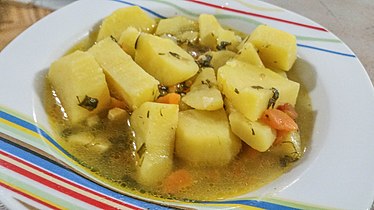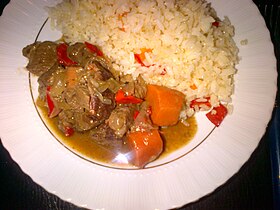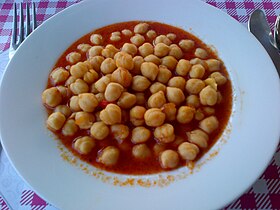 Beef yahnia in North Macedonia | |
| Alternative names | Yahni, yahnia, jahni, yakhna, yakhnia, iahnie |
|---|---|
| Type | stock, broth, or soup |
| Main ingredients | lamb meat or mutton meat |
Yakhni (Persian: یخنی,[1] Arabic: يخني, Urdu: یخنی, Hindi: यख़नी, Greek: γιαχνί[2]), yahni (Turkish[3]), or yahniya (Bulgarian: яхния, Serbian, Macedonian: јанија), jahni (Albanian[4]) is a class of dishes traditionally prepared in a vast area encompassing South Asia, the Middle East and the Balkans.[5]
A meat stew named yakhni originated as a Medieval Iranian cuisine. The name derives from the covered clay pot in which it was originally cooked.[5] The meaning of the Persian word is "store of food".[5][1] Different varieties of this dish later spread eastwards to Afghanistan, Uzbekistan and South Asia and westwards to the Ottoman Empire reaching the Levant and the Balkans.[5]
In Iranian cuisine, yakhni is a meat stew akin to khoresh, while yakhni-polow is a pilaf cooked in a stew.[5]
In Arab (especially Palestinian), Albanian, Greek, and Turkish cuisines, it is a stew of meat, fish, or vegetables in a browned-onion base with tomatoes and olive oil. In Bulgarian cuisine, sunflower oil is used instead of olive oil.
In Romanian cuisine, the term iahnie de fasole refers to a style of baked beans, often cooked or served with smoked meat and sausages (fasole cu cârnați).
In Pakistan and India, yakhni refers to stock or broth of beef, chicken, lamb or mutton.[6] It is touted for its health benefits[7] and is often the base for many foods including pulao[8] (a pilaf) and other shorbas (soups).
In Bangladesh, akhni is a mixed rice dish and variant of the biryani and polao dishes.
A version of the dish is also part of the Romani cuisine.[9]




